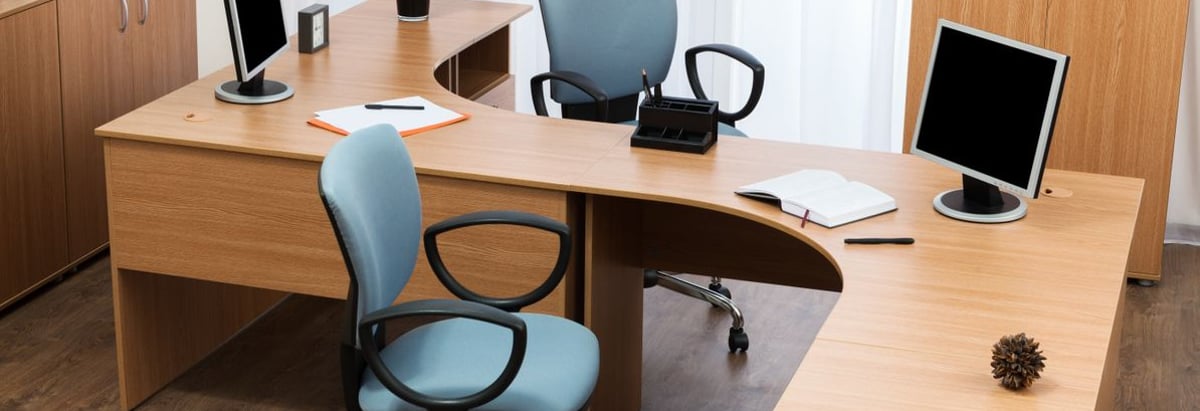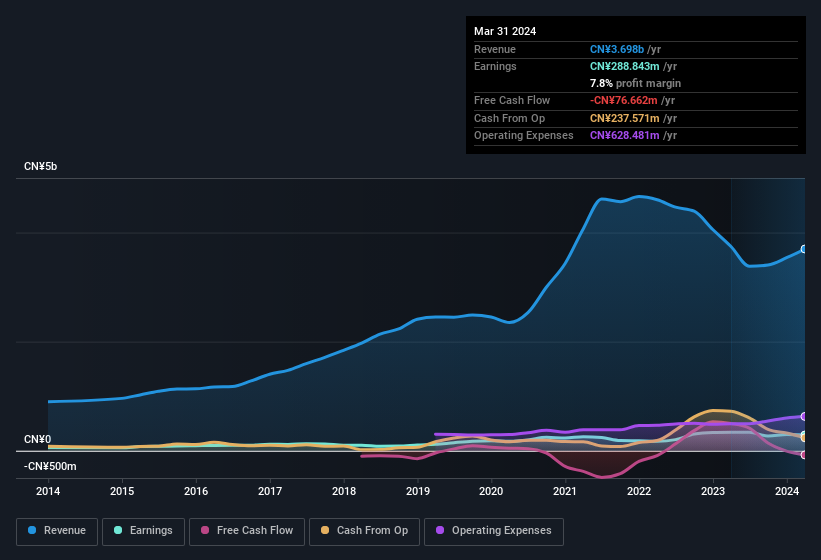- China
- /
- Commercial Services
- /
- SHSE:603600
We Believe That UE Furniture's (SHSE:603600) Weak Earnings Are A Good Indicator Of Underlying Profitability

The recent earnings release from UE Furniture Co., Ltd. (SHSE:603600 ) was disappointing to investors. We think there is more to the story than simply soft profit numbers. Our analysis shows that there are some other factors of concern.
View our latest analysis for UE Furniture

Examining Cashflow Against UE Furniture's Earnings
As finance nerds would already know, the accrual ratio from cashflow is a key measure for assessing how well a company's free cash flow (FCF) matches its profit. The accrual ratio subtracts the FCF from the profit for a given period, and divides the result by the average operating assets of the company over that time. You could think of the accrual ratio from cashflow as the 'non-FCF profit ratio'.
As a result, a negative accrual ratio is a positive for the company, and a positive accrual ratio is a negative. That is not intended to imply we should worry about a positive accrual ratio, but it's worth noting where the accrual ratio is rather high. To quote a 2014 paper by Lewellen and Resutek, "firms with higher accruals tend to be less profitable in the future".
For the year to March 2024, UE Furniture had an accrual ratio of 0.22. Unfortunately, that means its free cash flow fell significantly short of its reported profits. Over the last year it actually had negative free cash flow of CN¥77m, in contrast to the aforementioned profit of CN¥288.8m. It's worth noting that UE Furniture generated positive FCF of CN¥499m a year ago, so at least they've done it in the past. Having said that, there is more to consider. We must also consider the impact of unusual items on statutory profit (and thus the accrual ratio), as well as note the ramifications of the company issuing new shares. One positive for UE Furniture shareholders is that it's accrual ratio was significantly better last year, providing reason to believe that it may return to stronger cash conversion in the future. As a result, some shareholders may be looking for stronger cash conversion in the current year.
That might leave you wondering what analysts are forecasting in terms of future profitability. Luckily, you can click here to see an interactive graph depicting future profitability, based on their estimates.
To understand the value of a company's earnings growth, it is imperative to consider any dilution of shareholders' interests. As it happens, UE Furniture issued 11% more new shares over the last year. As a result, its net income is now split between a greater number of shares. To celebrate net income while ignoring dilution is like rejoicing because you have a single slice of a larger pizza, but ignoring the fact that the pizza is now cut into many more slices. You can see a chart of UE Furniture's EPS by clicking here.
How Is Dilution Impacting UE Furniture's Earnings Per Share (EPS)?
UE Furniture has improved its profit over the last three years, with an annualized gain of 12% in that time. Net profit actually dropped by 15% in the last year. But the EPS result was even worse, with the company recording a decline of 19%. And so, you can see quite clearly that dilution is influencing shareholder earnings.
If UE Furniture's EPS can grow over time then that drastically improves the chances of the share price moving in the same direction. But on the other hand, we'd be far less excited to learn profit (but not EPS) was improving. For the ordinary retail shareholder, EPS is a great measure to check your hypothetical "share" of the company's profit.
The Impact Of Unusual Items On Profit
Given the accrual ratio, it's not overly surprising that UE Furniture's profit was boosted by unusual items worth CN¥112m in the last twelve months. We can't deny that higher profits generally leave us optimistic, but we'd prefer it if the profit were to be sustainable. When we analysed the vast majority of listed companies worldwide, we found that significant unusual items are often not repeated. Which is hardly surprising, given the name. UE Furniture had a rather significant contribution from unusual items relative to its profit to March 2024. All else being equal, this would likely have the effect of making the statutory profit a poor guide to underlying earnings power.
Our Take On UE Furniture's Profit Performance
UE Furniture didn't back up its earnings with free cashflow, but this isn't too surprising given profits were inflated by unusual items. Meanwhile, the new shares issued mean that shareholders now own less of the company, unless they tipped in more cash themselves. For all the reasons mentioned above, we think that, at a glance, UE Furniture's statutory profits could be considered to be low quality, because they are likely to give investors an overly positive impression of the company. With this in mind, we wouldn't consider investing in a stock unless we had a thorough understanding of the risks. For example, UE Furniture has 3 warning signs (and 1 which doesn't sit too well with us) we think you should know about.
In this article we've looked at a number of factors that can impair the utility of profit numbers, and we've come away cautious. But there are plenty of other ways to inform your opinion of a company. For example, many people consider a high return on equity as an indication of favorable business economics, while others like to 'follow the money' and search out stocks that insiders are buying. So you may wish to see this free collection of companies boasting high return on equity, or this list of stocks that insiders are buying.
New: AI Stock Screener & Alerts
Our new AI Stock Screener scans the market every day to uncover opportunities.
• Dividend Powerhouses (3%+ Yield)
• Undervalued Small Caps with Insider Buying
• High growth Tech and AI Companies
Or build your own from over 50 metrics.
Have feedback on this article? Concerned about the content? Get in touch with us directly. Alternatively, email editorial-team (at) simplywallst.com.
This article by Simply Wall St is general in nature. We provide commentary based on historical data and analyst forecasts only using an unbiased methodology and our articles are not intended to be financial advice. It does not constitute a recommendation to buy or sell any stock, and does not take account of your objectives, or your financial situation. We aim to bring you long-term focused analysis driven by fundamental data. Note that our analysis may not factor in the latest price-sensitive company announcements or qualitative material. Simply Wall St has no position in any stocks mentioned.
About SHSE:603600
UE Furniture
Engages in the research, development, production, and sale of healthy seats in China and Internationally.
Adequate balance sheet average dividend payer.


